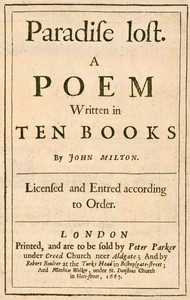| Author |
Milton, John, 1608-1674 |
| Title |
Paradise Lost
|
| Note |
Wikipedia page about this book: https://en.wikipedia.org/wiki/Paradise_Lost
|
| Note |
Reading ease score: 45.7 (College-level). Difficult to read.
|
| Note |
See also #26, which is from a substantially different print edition. #20 has 10 books, while #26 has 12 books.
|
| Credits |
Judy Boss
|
| Summary |
"Paradise Lost" by John Milton is an epic poem written during the early 17th century. The poem explores profound themes such as free will, redemption, and the nature of good and evil, primarily through the story of humanity's fall from grace. Central characters include Satan, whose rebellion against God leads to his downfall, and Adam and Eve, whose disobedience results in their expulsion from Eden. The opening of "Paradise Lost" sets the stage for the cosmic struggle between good and evil following Satan's rebellion against God. It begins with an invocation to the Muse, seeking divine inspiration to recount the story of mankind's "First Disobedience" and the subsequent consequences. We learn of Satan’s envy and fury after his expulsion from Heaven and his plans to corrupt God's newest creation, humanity. The poem establishes a tone of grandiosity and gravity, outlining the tragic foreshadowing of humanity's plight while emphasizing themes such as ambition, loss, and the delicate balance between free will and predestination. (This is an automatically generated summary.)
|
| Language |
English |
| LoC Class |
PR: Language and Literatures: English literature
|
| Subject |
Fall of man -- Poetry
|
| Subject |
Adam (Biblical figure) -- Poetry
|
| Subject |
Eve (Biblical figure) -- Poetry
|
| Subject |
Bible. Genesis -- History of Biblical events -- Poetry
|
| Category |
Text |
| EBook-No. |
20 |
| Release Date |
Oct 1, 1991 |
| Most Recently Updated |
Aug 25, 2021 |
| Copyright Status |
Public domain in the USA. |
| Downloads |
2227 downloads in the last 30 days. |
|
Project Gutenberg eBooks are always free!
|

